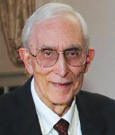Alan C. Sartorelli, PhD, Alfred Gilman Professor of Pharmacology at Yale University School of Medicine, Past President of the American Association for Cancer Research (AACR), and a Fellow of the AACR Academy, died on April 30, 2015.
A pioneer in cancer chemotherapy, Dr. Sartorelli was one of the first scientists to recognize the importance of matching the right drug to the right tumor. His work was at the forefront of the research that led to the current personalized approach to each cancer based on a patient’s genetic makeup. More recently, his work involved designing, synthesizing, and evaluating candidate cancer drugs on the basis of the molecular mechanism of action by which they exert their anticancer effects and the mechanisms by which malignant cells sometimes circumvent the cytodestructive action of drugs.
A Pioneer Across All Categories
Dr. Sartorelli received a bachelor of science degree from Northeastern University, a master’s in chemistry from Middlebury College, and a doctorate from the University of Wisconsin. His early training was at the McArdle Institute for Cancer Research.
He later joined the faculty of the Yale University School of Medicine, served as Chairman of the Department of Pharmacology from 1977 to 1984, and as Director of the Yale Comprehensive Cancer Center from 1984 to 1993. During his term as Director, he launched one of the first mobile mammography vans in the country. He served the National Cancer Institute for several decades as a member of a number of committees and advisory groups.
He was President of the AACR from 1986 to 1987 and was a member of the AACR Board of Directors from 1975 to 1978 and again from 1984 to 1987. During his term as AACR President, he established the series of focused special conferences in cancer research, a thriving program that continues to expand today, and was an early advocate for an Associate Member category for young investigators. Associate Members, who are the future of the cancer field, now encompass about one-third of the AACR membership. He served as President of the Association of American Cancer Institutes in 1987.
“Not only was Dr. Sartorelli way ahead of his time in developing therapeutics, he realized early on the role of genetics in targeted cancer therapy,” said AACR CEO Margaret Foti, PhD, MD. “He will be sorely missed by all of us in the AACR.”
Major Contributions to Scientific Literature
“He was a strong supporter of expanding the AACR’s publishing program beyond our flagship journal Cancer Research and was a valued advisor and close friend. Because of his innovative spirit and inspirational leadership, he was able to uniquely conceptualize how the AACR could become even more contributory to the multidisciplinary field of cancer research,” Dr. Foti added.
As an author of nearly 500 research papers, Dr. Sartorelli maintained a lifelong interest in scientific literature. He manifested his unique editorial expertise in scientific journal publishing when he was Chair of the AACR Publications Committee from 1981 to 1988 and urged the organization to start a molecular biology journal (Cell Growth & Differentiation, which evolved into Molecular Cancer Research).
His committee also oversaw the change in frequency of Cancer Research to twice monthly in 1987 and worked to secure additional funding for the journal. He was a longtime Associate Editor of Cancer Research, Executive Editor of Biochemical Pharmacology Journal, and the founding editor of Pharmacology and Therapeutics.
Dr. Sartorelli shared a love of music with his late wife, Alice. An opera buff and student of voice and guitar, he served as Chair of the Shubert Opera Board in New Haven, Connecticut. ■


